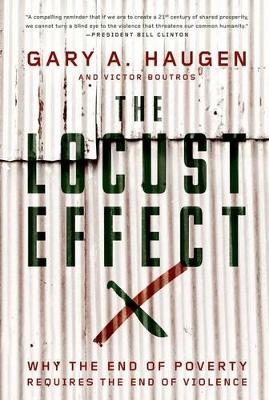
The Locust Effect
Oxford University Press Inc (Verlag)
978-0-19-993787-5 (ISBN)
Gary Haugen and Victor Boutros's The Locust Effect focuses on the central role of violence in perpetuating poverty, and shows that if any headway is to be made, this issue has to become a top priority for policymakers. Simply put, if people aren't safe, nothing else matters. Shipping grain to the poor, helping them vote, or assisting their efforts to start a farm is irrelevant. Whatever material improvements we provide will simply wash away in the face of the corrupt police forces, out-of-control, armies, private militias, organized criminals, and -- not least -- failed justice systems that plague poor countries. Throughout, the book will feature real-world stories ranging from Thailand to Bolivia to India to Nigeria that vividly depict how violence undercuts antipoverty efforts. While they argue that this violence is the fundamental issue facing the antipoverty movement, they do not merely identify the problem. They also draw from their experience running the International Justice Mission to show that ground-up efforts to reform legal and public justice systems can generate real, positive results. Sweeping in geographical scope and filled with unforgettable stories of individuals trapped within the mutually reinforcing cycle of poverty and violence, The Locust Effect will force us to rethink everything we know about the causes of poverty and why it is so difficult to root out.
Gary Haugen is President and CEO of International Justice Mission and Lecturer at the University of Chicago Law School Victor Boutros serves a federal prosecutor who investigates and tries international human trafficking, official misconduct, and hate crimes cases around the country on behalf of the U.S. Department of Justice. He holds degrees from Baylor, Harvard, Oxford, and the University of Chicago. He has written on human rights and foreign affairs and has been a lecturer on the faculty of the University of Chicago Law School.
I. The Deeper Waters of Violence ; Chapter One: The Desperate Drama Beneath the Surface ; Chapter Two: Five Nightmares that Destroy the Dream ; II. If You're Not Safe, Nothing Else Matters ; Chapter Three: The Poor Have No Protection and The Emperor Has No Clothes Chapter Four: No Medical Remedy for Violence ; Chapter Five: Violence and the Dream of Universal Human Rights ; Chapter Six: Interesting But Not Helpful ; III. The Invisible Oxygen the Global Poor Don't Get to Breathe ; Chapter Seven: Impunity Not Poverty ; Chapter Eight: The Invisible Oxygen of Law and Order ; Chapter Nine: Inside the Public Justice Pipeline ; IV. Why So Broken? Three Surprising Stories ; Chapter Ten: The Absurdity that Makes Sense ; Chapter Eleven: Private Substitutes for Public Justice ; Chapter Twelve: You Get What You Pay For ; Chapter Thirteen: Threats to the Status Quo ; V. Justice is Possible for the Poor: The Problem that Simply Must-and Can-be Solved ; Chapter Fourteen: Hope and the Recovery of a Lost History ; Chapter Fifteen: Lessons of Hope from an Emerging Methodology ; Chapter Sixteen: A Way Forward: What We All Need to Do Now
| Erscheint lt. Verlag | 13.3.2014 |
|---|---|
| Verlagsort | New York |
| Sprache | englisch |
| Maße | 163 x 239 mm |
| Gewicht | 612 g |
| Themenwelt | Geisteswissenschaften ► Religion / Theologie |
| Recht / Steuern ► EU / Internationales Recht | |
| Sozialwissenschaften ► Pädagogik ► Sozialpädagogik | |
| Sozialwissenschaften ► Politik / Verwaltung | |
| Sozialwissenschaften ► Soziologie ► Spezielle Soziologien | |
| ISBN-10 | 0-19-993787-7 / 0199937877 |
| ISBN-13 | 978-0-19-993787-5 / 9780199937875 |
| Zustand | Neuware |
| Informationen gemäß Produktsicherheitsverordnung (GPSR) | |
| Haben Sie eine Frage zum Produkt? |
aus dem Bereich


